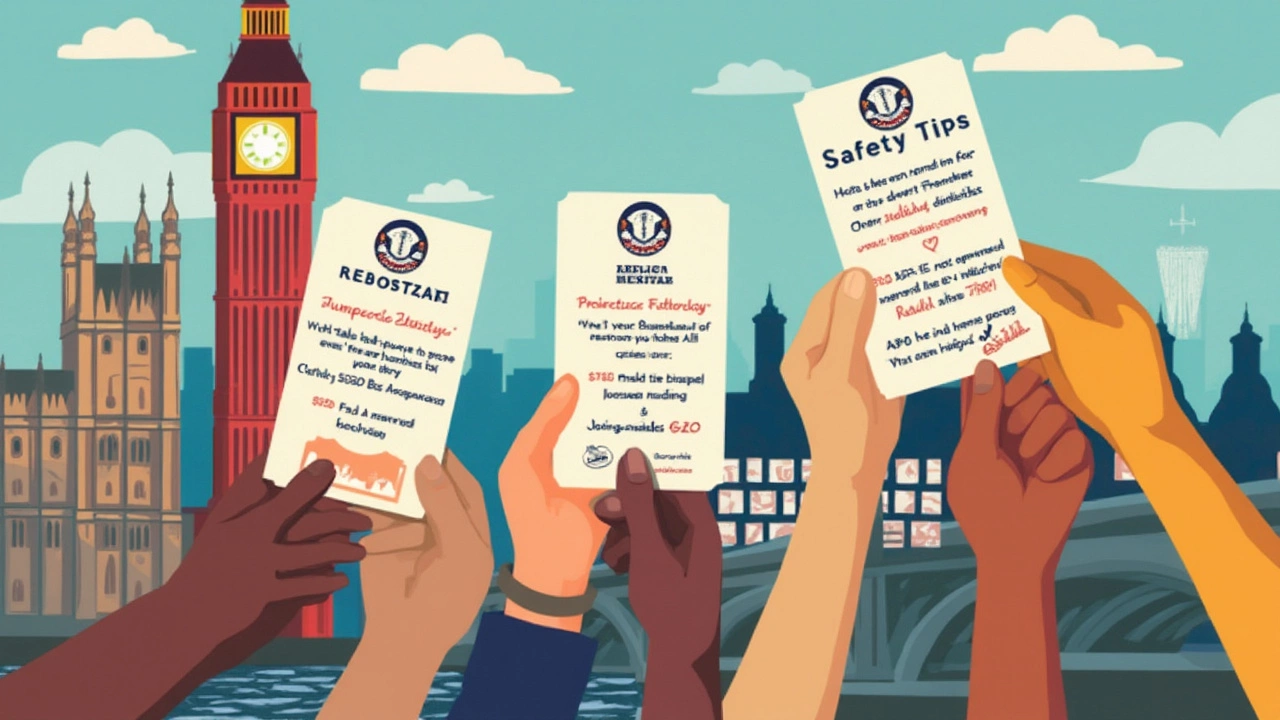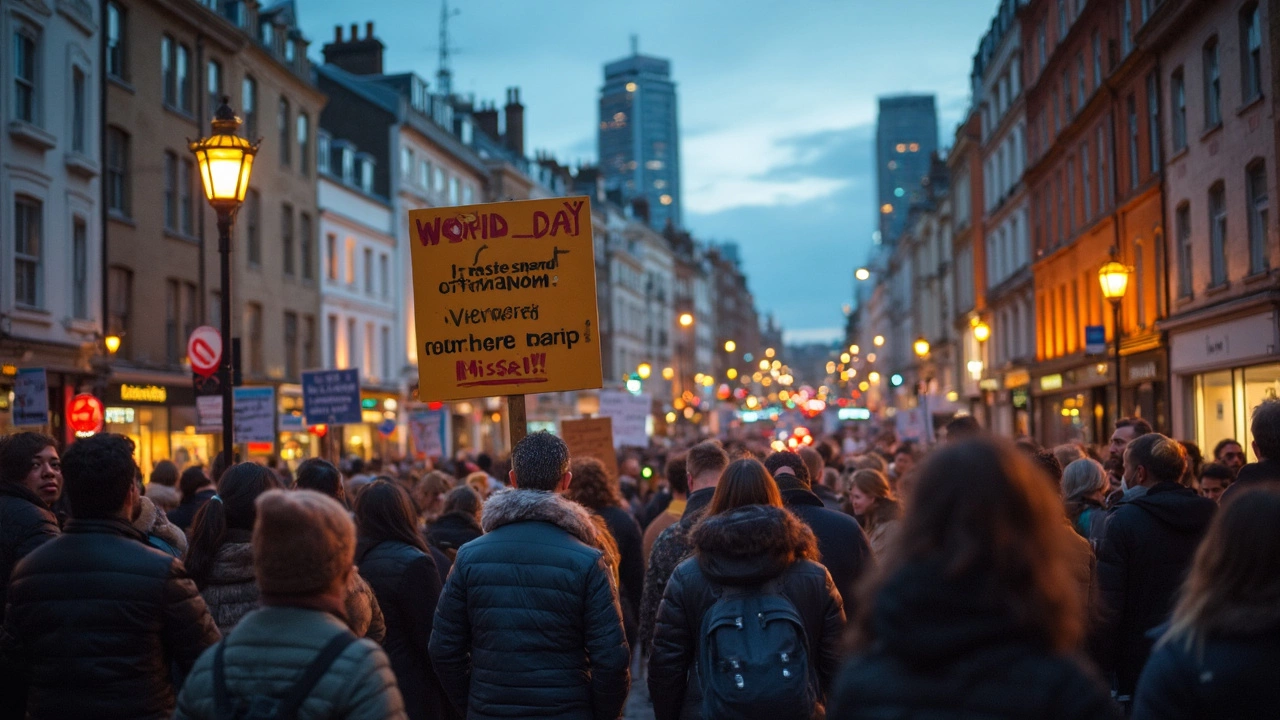When June 12 rolls around, most people don’t mark it on their calendar as the World Day for Health and Safety. But for sex workers—whether you’re working indoors, on the street, or in high-end London escort agencies—it’s a day that shines a spotlight on rights, real risks, and the need for basic protections many take for granted.
Safety isn’t just about avoiding violence. Think about regular health checkups, being able to report threats to the police without fear, and knowing there’s a community ready to help. Even simple stuff, like a reliable way to verify clients or a panic button app on your phone, can change everything. Sex workers often share clever hacks with each other, like meeting in well-lit public spots or keeping check-in texts with trusted friends every hour on the job. These aren’t secrets—they’re practical tips that keep people safer every day.
When it comes to protecting all sex workers, it’s not just about bigger laws or government policies. It’s about real solutions, starting with easy-to-follow routines, access to judgment-free healthcare, and support that actually works on the ground. Knowing where you can get private STI testing, free legal advice, or even mental health resources can turn a risky situation into a manageable one.
- Why World Day for Health and Safety Matters
- Everyday Risks and Real Stories
- Concrete Tips for Health and Safety
- Legal Realities for Sex Workers
- How Everyone Can Help
Why World Day for Health and Safety Matters
If you think World Day for Health and Safety is just another awareness day, it’s way more than that. For people in the sex industry, this day highlights the fight for respect, better working conditions, and actual safety. It calls attention to how far we still need to go in protecting all sex workers, especially in cities like London where the industry is a big part of the urban scene.
Let’s talk facts. Sex workers face way higher risks of violence, STIs, and mental health struggles than most jobs. The English Collective of Prostitutes reports that over 70% of sex workers in the UK have experienced violence at work. In London, regular health checks and even basic police protection can be out of reach for many because of stigma or unfair laws. That’s why a dedicated day matters—it gets people talking openly about real issues, not just hidden shame or stereotypes.
You might be surprised at the numbers. Here’s a look at some important points that drive home why health and safety matter in this line of work:
| Issue | Sex Workers | General UK Workforce |
|---|---|---|
| Experience violence on the job | 72% | 5-7% |
| Access to regular health checks | Less than 50% | 90%+ |
| Report crimes to police | Under 20% | Over 60% |
Most folks don’t realize that when sex workers, including London escorts, can work safely, everyone wins. It reduces pressure on public health, stops both workers and clients from hiding health issues, and lets workers live with dignity. You get a safer city, less crime, and healthier communities. That’s why this day exists—to push for clear solutions, not just more talk.
Everyday Risks and Real Stories
It’s easy to ignore what sex workers really deal with until you hear their stories. Daily risks go way beyond the scary stuff most people expect. Sure, threats of violence are real, but so are scams, fake bookings, or people refusing to pay for their time. The stress piles up fast when your job means trusting new faces every night or worrying about neighbors finding out where you work.
The mental load isn’t something you see in tabloid headlines either. A lot of sex workers end up feeling isolated or anxious. Not everyone can just call a friend to pick them up from a bad situation. One survey in the UK found nearly half of all sex workers have turned down bookings that felt shady, which sounds like common sense but also means losing income if staying safe is always up to you.
Take London escorts for example. The number of women working independently or for agencies keeps growing. They swap tips about keeping client meetings public at first or sticking to regulars with trusted reviews. Some rely on driver services. Others set up code words to use with friends or family if things take a wrong turn. These simple habits don’t erase risk, but they help.
Physical health is another big deal. Getting regular screenings and fast access to judgment-free healthcare makes a difference. Because of the stigma and legal grey zones, many sex workers in London and other big cities hesitate to get medical help after a scary situation. Small changes, like clinics offering walk-in appointments specifically for sex workers, give people a safer option and build trust.
World Day for Health and Safety is a reminder that these stories aren’t rare. The pressure to hide what you do or fear judgment stops a lot of people from getting the support they need. Open conversations and better protections aren’t just nice—they’re necessary for real safety and healthy lives.

Concrete Tips for Health and Safety
Want to stay safer on the job? Here are some practical tips every sex worker can use, whether you’re seeing regulars or new clients. Most tips floating around, especially among London escorts, are based on tried-and-tested experience—not guesswork.
World Day for Health and Safety isn’t about grand speeches; it’s about smart routines. For starters, always let a trusted friend or fellow worker know where you are. Loads of people use code words or scheduled check-in texts. Don’t skip this step—it’s saved lives in real situations. Apps like “Safe Escort” or “A Safer Space” work for sending instant location updates if anything feels off.
- Always trust your gut. If a client seems sketchy or pushes for your boundaries, it’s fine to walk away—even if it means losing money.
- Use condoms and dental dams for all sexual contact, even if a client says they’re clean. Clinics in London (like BSHS and Open Doors) offer free sexual health check-ups—easy to book without giving your name.
- Have a quick exit plan. Make sure you know how to leave a flat or hotel quickly, and never let clients block the door.
- Digitally, blur your face on ads and never share your phone number or real address. Use different email addresses for work and personal stuff.
- Use “bad client” alert groups. Sex workers in cities like London often tip each other off about people who don’t respect boundaries or have a history of causing trouble.
If you’re working through an agency, check if they offer chaperones, taxi services, or onsite panic buttons. And for independent folks, portable alarms or even a loud whistle on your keys can make a difference if something turns south.
Last thing: don’t forget mental health. Sex work can be lonely and stressful, so having a therapist or peer support group—like NUM in the UK—can help you bounce back from tough days.
Legal Realities for Sex Workers
Talking about the legal side of being a sex worker in the UK is like trying to play a board game where nobody agrees on the rules. The act of selling sex by itself isn’t illegal, but nearly everything around it can trip you up—like running a brothel, working in teams, or even helping out a colleague. This can make it confusing and risky, especially for sex workers trying to keep things above board.
If someone is working solo in London, that’s technically allowed. But as soon as another worker joins for safety or company, it might be considered brothel-keeping, which is against the law. Many sex workers, especially those on sites like sex workers, say this forces them to pick between safety and legal trouble. A 2024 report from a UK rights group found 56% of London escorts have faced police checks or questioned over brothel-related laws, even when they weren’t doing anything shady.
Here’s a snapshot of legal issues you might face:
- Advertising is a legal gray area—ads are allowed but pimping or ‘controlling’ is not
- Working together is illegal, but so is working totally alone if it means more risk
- Reporting threats or abuse doesn’t always lead to support because police might focus more on possible crimes than on protection
Need a quick look at the facts? Check out this table:
| Activity | Legal Status (UK) | Common Risks |
|---|---|---|
| Working alone | Usually legal | Isolation, easy target for crime |
| Working with others | Illegal (seen as a brothel) | Arrest, police attention |
| Brothel keeping | Illegal | Severe legal penalties, court cases |
| Advertising online | Usually legal | Pimping allegations possible |
So, if you’re thinking about working as a London escort, knowing your legal rights and local risks isn’t just smart—it’s survival. Staying updated means checking out community legal clinics, reading up on changing rules, or teaming up with networks who’ve been through it before.

How Everyone Can Help
It’s easy to feel like protecting all sex workers is just up to lawmakers or charities, but regular people actually have a huge impact. Whether you know someone in the field or you’re a total outsider, there are concrete steps you can take—big and small—to make things safer and healthier for everyone involved.
First, get the facts straight. According to the English Collective of Prostitutes, over 70% of sex workers in the UK are mothers and many work to support their families. Judging or isolating them only makes their lives more dangerous. Even changing the way we talk about sex work, by using respectful language instead of slurs, chips away at stigma and lets people feel safer asking for help.
If you want to be part of real change, here’s what you can actually do:
- Support harm reduction services. Donate to local groups that hand out condoms, self-defense tools, or offer safe spaces for sex workers—especially during big events when the risk goes up.
- Stand up when you hear myths or hate. Correct people with facts rather than shaming anyone—most misconceptions just haven’t been questioned out loud before.
- Push for better policies. Emailing your local MP or councilperson about things like safe reporting zones actually works. In 2024, London’s Metropolitan Police piloted a program that let sex workers report crimes anonymously—and it boosted trust and reporting rates by 42% in just six months.
- Buy from businesses and organizations that openly support sex workers, like cafes or clothing brands that donate a cut of their profits. Every pound counts toward visibility and better support.
- Connect people to tried-and-true resources. If someone needs health testing or a place to talk, groups like SWARM and Basis Yorkshire offer everything from workshops to legal help.
Some folks even take it a step further and volunteer for sex worker support lines—which is sorely needed, since wait times have doubled since 2022.
Here’s a quick look at the impact of community help, based on data from 2024:
| Type of Support | Change in Safety Reports (2023-2024) |
|---|---|
| Funding outreach vans | +35% |
| Running local health clinics | +28% |
| Supporting safe online platforms | +41% |
| Anonymous crime reporting | +42% |
It doesn’t take a hero to make a difference. Every conversation, small donation, or shared resource adds up. Next time World Day for Health and Safety comes around, remember: supporting and protecting all sex workers makes our communities stronger and a bit more human. Even my cat Midge could agree—everyone deserves a safe spot to land after work.
